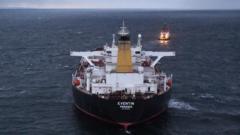A recent study by the University of Stavanger has validated the claims of families affected by the 1980 Alexander Kielland oil rig disaster, arguing that Norwegian authorities prioritized the oil industry's reputation over justice for the victims.
Families of Kielland Disaster Victims Hope New Study Will Bring Justice

Families of Kielland Disaster Victims Hope New Study Will Bring Justice
The University of Stavanger's report highlights systemic failings in the aftermath of the tragic 1980 oil rig disaster, which killed 123 individuals.
Families who lost loved ones in the 1980 Alexander Kielland oil rig disaster have expressed hope following a new report that reinforces their long-standing claims of justice denied. The ill-fated platform, functioning as an accommodation block, capsized during a storm in the Norwegian North Sea, resulting in the death of 123 individuals, including 22 from the UK. The University of Stavanger's critical study highlights how authorities failed both survivors and the families of the deceased, corroborating a previous apology issued by the Norwegian government.
Laura Fleming, daughter of victim Michael Fleming, welcomes the report, stating that it sheds light on the real circumstances of the tragedy. Michael Fleming, along with four other men from Cleator Moor, succumbed when the rig capsized about 200 miles off the Norwegian coast on March 27, 1980. As a member of the Kielland Network of families, Laura has been advocating for answers and accountability, stressing that many questions surrounding her father's death remain unanswered.
The study recognizes that Norwegian authorities appeared more focused on safeguarding the oil industry's reputation rather than conducting a thorough investigation into the disaster. Instead of addressing and examining the complexities that led to the capsize, officials blamed the incident on the failure of a leg of the four-year-old platform manufactured in France.
Living in Durham, Ms. Fleming recalls how families were under severe pressure to accept settlements without receiving adequate explanations about the circumstances surrounding the rig's sinking. She argues that a conscious choice was made by the Norwegian government to avoid a full investigation, fearing it would adversely affect the flourishing oil sector that brought considerable wealth to the nation.
Though the government has previously acknowledged shortcomings in its inquiries, it ruled in 2021 that a new investigation would not provide any additional insights. Despite this, Ms. Fleming remains hopeful that the findings of the recent study can play a pivotal role in uncovering the truth and obtaining the justice that families like hers have long sought.





















